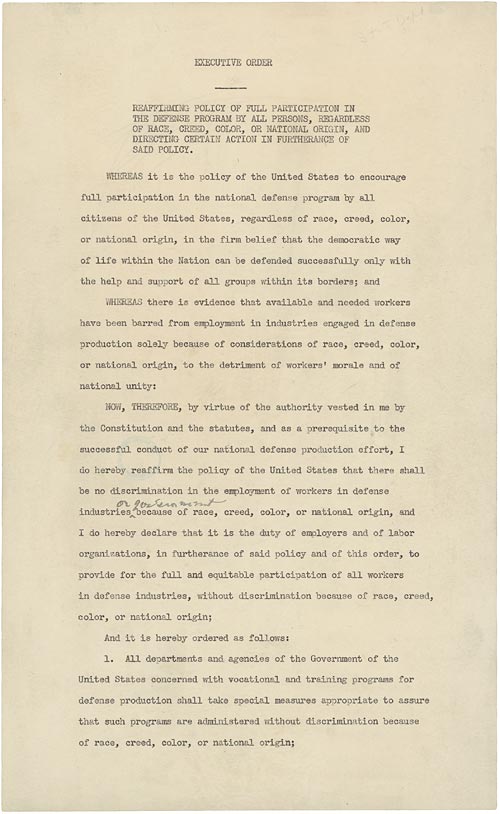
Executive Order 8802: Prohibition of Discrimination in the Defense Industry (1941)
In June of 1941, President Roosevelt issued Executive Order 8802, banning discriminatory employment practices by federal agencies and all unions and companies engaged in war-related work. The order also established the Fair Employment Practices Commission to enforce the new policy.
In early 1941, millions of jobs were being created, primarily in urban areas, as the United States prepared for World War II. When large numbers of African Americans moved to cities in the north and west to work in defense industries, they were often met with violence and discrimination.
In response, A. Philip Randolph, president of the Brotherhood of Sleeping Car Porters, and other Black leaders, met with Eleanor Roosevelt and members of the President’s cabinet. Randolph presented a list of grievances regarding the civil rights of African Americans, demanding that an executive order be issued to stop job discrimination in the defense industry. Randolph, with others, threatened that they were prepared to bring "ten, twenty, fifty thousand Negroes on the White House lawn" if their demands were not met.
In reaction to the fear of tens of thousands—if not more—African Americans marching on the nation’s capitol, and after consultation with his advisers, Roosevelt responded to the Black leaders and issued Executive Order 8802 on June 25th. It declared, "There shall be no discrimination in the employment of workers in defense industries and in Government, because of race, creed, color, or national origin." It was the first Presidential directive on race since Reconstruction. In exchange for Executive Order 8802, Randolph called off the march, though he would be a driving force of the 1963 March on Washington.
To investigate “complaints of discrimination in violation of the provisions of this order” Executive Order 8802 established the “Committee on Fair Employment Practice.” More commonly known as the Fair Employment Practice Committee (FEPC), it has been disregarded by most historians as a powerless and ineffectual agency, especially in the South. After World War II, the FEPC almost became a permanent agency, but a strong voting bloc in Congress prevented it. Shortly after the dismantling of the FEPC, President Truman issued Executive Order 9981 banning segregation in the military.

